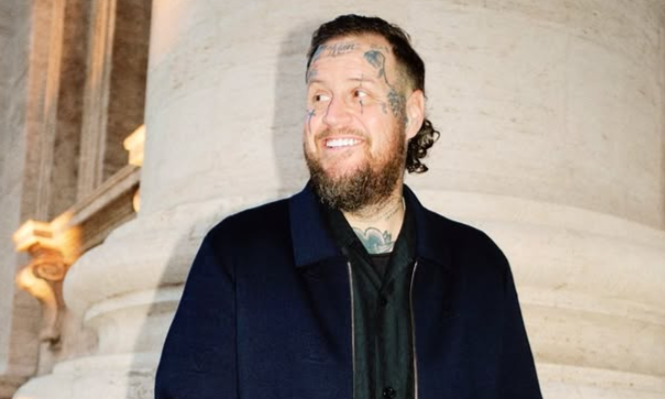Jelly Roll Builds 100 Acre Rehab Center for Those Seeking a Second Chance

Jelly Roll has built his career on brutal honesty. His songs are steeped in pain, redemption, and gratitude, carrying the echoes of a man who’s lived on both sides of hope. Now, the country-rap star is transforming his message into something even more tangible: a completely free, 100-acre rehabilitation and mental health center on his Tennessee property. It’s a personal mission rooted in the same struggles that once nearly destroyed him.
The musician, whose real name is Jason DeFord, shared the news in an emotional video filmed on his land. Standing barefoot in the grass, he spoke directly to his followers, saying he came there to “pray over it” and “vision cast in it.” He described the moment as surreal, a full-circle realization of how far he’s come. “Generational curses were broke because of y’all,” he said. “I’m standing here breaking one right now.”
For a man who once believed his story might end in tragedy, the idea of building a sanctuary for recovery feels like a miracle in motion. And for thousands who have followed his journey from addiction to artistry, it feels like proof that second chances can grow from even the most broken soil.
A Dream Born from Struggle
To understand why this project matters so deeply, you have to know where Jelly Roll came from. Long before the fame, he was an at-risk kid in Antioch, Tennessee, surrounded by poverty and instability. His teenage years were marked by bad decisions that spiraled into a cycle of arrests, drug use, and time behind bars. In interviews, he’s said he often felt trapped in a pattern he couldn’t escape. Music was his way out. He started selling mixtapes out of his car, telling stories about the street life he knew too well.
His lyrics, raw and confessional, captured the pain of a young man who wanted redemption but didn’t yet know what it looked like. Over time, those mixtapes became a lifeline both for him and for the people who saw their own struggles reflected in his songs.
When Jelly Roll became a father, everything shifted. The birth of his daughter gave him a reason to confront his demons and choose sobriety. It wasn’t easy, and he’s never pretended otherwise. His openness about relapse, regret, and recovery has become central to his identity as an artist. That honesty is now shaping his next chapter one where the music inspires action.
Building Hope on 100 Acres

The land that will host Jelly Roll’s rehabilitation campus spans over 500 acres of Tennessee countryside. Of that, he plans to dedicate 100 acres to the recovery and mental health center. He envisions a place where people can start over, surrounded by nature and community support rather than clinical walls.
The facility will offer a range of programs, including traditional 28-day, 12-step-style treatment plans and more intensive options focused on therapy and mental health. Jelly Roll has explained that he wants the center to address both the physical and emotional dimensions of recovery. “You’ll have a traditional 28-day, 12-step style, but then we’ll have intensive programs as well for therapy and mental health,” he told Relevant Magazine. “It’s about wraparound support, not just detox.”
What makes the plan remarkable is that it will be completely free. There will be no insurance forms, no billing, and no financial barriers. For many people struggling with addiction, the cost of treatment can be the biggest obstacle. By removing that hurdle, Jelly Roll hopes to make recovery accessible to anyone who’s ready to fight for it.
He’s funding the project himself, using proceeds from his 2024 album Beautifully Broken. The album’s themes of hope and redemption mirror the mission behind the facility. As he explained in an interview with TODAY, “Redemption and hope is where it leads to. If we’re honest and vulnerable about where we’re broken, that could create more conversations to grow and move forward.”
A Community of Healing

Jelly Roll’s vision isn’t limited to clinical recovery. He wants to build a true community of healing. Part of the plan includes something he calls “guest weekenders” people who will come stay on the campus for a few days to spend time with those in recovery. They’ll share meals, get their hands dirty, and engage directly with participants rather than just giving motivational speeches from a podium.
“Come in and spend the weekend with the boys,” Jelly Roll explained in one of his videos. “Leave the phone and get in the trenches with the guys.” It’s a concept rooted in empathy and shared experience, blurring the line between those offering help and those receiving it.
This approach reflects Jelly Roll’s belief that connection is central to recovery. It’s not just about removing substances from the body but about filling the emptiness that remains. He wants the campus to feel less like an institution and more like a family a place where people can rediscover their worth through relationships and purpose.
His friend Mike Majlak, who has also battled addiction, was deeply moved by the idea. “Is there anything you can’t do, bro?” Majlak said in response. “Everything you do, everything you say is so impactful and meaningful.” Their conversation highlighted the sense of shared understanding between people who’ve been through the same darkness and found their way back.
From Addiction to Advocacy

In recent years, Jelly Roll has evolved from an artist telling his story to a national advocate for addiction awareness. Earlier in 2024, he testified before the United States Senate about the fentanyl crisis, speaking candidly about his own past involvement in drug dealing and the damage it caused. His testimony struck a chord because it wasn’t filtered or polished it was human.
“I’ve been to too many funerals,” he said, describing friends lost to overdose and the ripple effects that followed. His call for more compassionate, accessible recovery solutions resonated with lawmakers and audiences alike. The 100-acre rehabilitation center can be seen as the next step in that advocacy, a concrete response to the problem he spoke about in Washington.
In many ways, Jelly Roll’s project stands apart from celebrity charity initiatives. It’s not a brand partnership or a media stunt. It’s a continuation of his life’s message that redemption isn’t just possible, it’s a responsibility. He’s not interested in building monuments to success but sanctuaries for survival.
Breaking the Cycle

The idea of breaking “generational curses” has become a recurring theme in Jelly Roll’s story. When he speaks about his past, it’s often through the lens of what he calls “cycles” poverty, addiction, incarceration, and self-doubt passed from one generation to the next. His own success, he says, only matters if it helps end that pattern.
By establishing a place for recovery and renewal, he hopes to give others the same opportunity he found. “This is not what I expected,” he said in his TikTok announcement. “People ask if I ever dreamed I’d be playing arenas. I was never brave enough to dream that I’d be here like this today.”
That humility resonates with fans because it’s authentic. Jelly Roll doesn’t present himself as a savior or as someone who has it all figured out. He’s still learning, still healing, and still working to stay grounded. His wife, Bunnie Xo, often joins him in philanthropic efforts, and together they’ve become a power couple dedicated to giving back. Between raising their family, managing a farm, and pursuing creative projects, they’ve built a life that’s both busy and purpose-driven.
Fans Find Hope in His Journey
When Jelly Roll revealed his plan for the rehab center, fans flooded social media with messages of love and admiration. Many shared their own stories of recovery, crediting his music for helping them through dark times. One commenter wrote, “I’ve battled years of addiction and been clean for 13 years now. I love Jelly’s music. You are a huge inspiration to me.” Another said, “You helped me realize that no matter the trauma I’ve endured, I can still be someone.”
For those who’ve followed his career, this project feels like a natural progression. He’s been visiting jails, talking with at-risk youth, and using his platform to amplify stories of survival for years. The rehabilitation center simply turns that message into a living, breathing space one where others can write their own redemption stories.
His fans see in him what they often struggle to see in themselves: proof that it’s possible to rebuild, even after years of self-destruction. Jelly Roll has become more than an artist; he’s a mirror reflecting back the resilience of those who refuse to give up.

Redefining Recovery
Most rehabilitation facilities in the United States operate as for-profit institutions, often charging thousands of dollars a month. For people without insurance or savings, that price tag can feel like another sentence. Jelly Roll’s vision challenges that model entirely. By removing cost and stigma, he’s aiming to redefine what recovery can look like not a service for the privileged, but a right for anyone who seeks healing.
His plan is also innovative in its design. He wants the campus to combine physical wellness, mental health care, and community connection under one umbrella. That means not just therapy and detox programs but holistic health elements like nutrition, physical activity, and mindfulness. The inclusion of outdoor space open fields, hiking trails, and natural gathering areas reflects his belief that nature itself can be part of the recovery process.
The facility will likely employ a mix of medical professionals, counselors, and mentors with lived experience. That last group is key to Jelly Roll’s philosophy. In his view, people who’ve walked through addiction are uniquely equipped to guide others through it. It’s empathy as expertise, and it’s central to what will make the campus different.
Giving Back to Tennessee
For all the national attention Jelly Roll has received, his heart remains firmly rooted in Tennessee. The rehabilitation campus will be built on his own property, in the same region where he once struggled to find his footing. He’s said that his goal isn’t just to help individuals recover, but to strengthen entire communities.
Tennessee, like much of the South, faces significant challenges in addiction and mental health care. Access to affordable treatment is limited, particularly in rural areas. By locating the facility in Middle Tennessee, Jelly Roll is investing directly in the region that raised him and in the people who remind him of his younger self.
Local reactions have been overwhelmingly positive. Fans and neighbors have described the project as “hope made visible.” Many see it as a model that could inspire other artists, athletes, and public figures to take similar action. If successful, it could become a template for community-driven recovery centers across the country.

Image Credits – Instagram @jellyroll615
A Legacy Beyond Music
For Jelly Roll, this project isn’t about legacy in the traditional sense. It’s not about building something that bears his name forever, but about creating something that will outlast him in purpose. He’s spoken openly about wanting the center to be self-sustaining, supported by those it helps and those who believe in its mission.
“This isn’t charity,” he’s said. “It’s a promise.” A promise to himself, to his family, and to the countless people still trapped in the same pain he once knew. It’s about turning gratitude into action and making good on the belief that redemption is most powerful when it’s shared.
The symbolism of transforming his land is hard to ignore. The same ground where he once walked in reflection will soon become a space for collective healing. It’s a physical manifestation of what his music has always preached: that brokenness can be beautiful, and that even the hardest lives can bear fruit.
A New Chapter of Redemption
Jelly Roll’s story is still unfolding. From a teenager in trouble with the law to a Grammy-nominated artist, from addiction to advocacy, he’s lived every lyric he’s written. His success has never erased his past it’s illuminated it, showing others that the same road that once led to ruin can lead to redemption.
The planned rehabilitation center represents the culmination of everything he’s stood for. It’s a testament to how far he’s come and how deeply he believes in giving others the chance to follow. Whether or not the facility becomes a national model, it already stands as a symbol of what can happen when empathy meets action.
In a world often cynical about celebrity intentions, Jelly Roll’s plan feels refreshingly real. It’s not glamorous. It’s not about headlines. It’s about people the ones still fighting, still hoping, still looking for a way home.
As he once said in gratitude to his fans, “I never would have dreamed that this could have been anything about my story.” Yet here he stands, building something that will write a thousand more. His 100-acre dream isn’t just a rehabilitation center. It’s a living, breathing second chance for everyone who believes their story is already written.
Featured Image From Instagram @jellyroll615
Loading...

